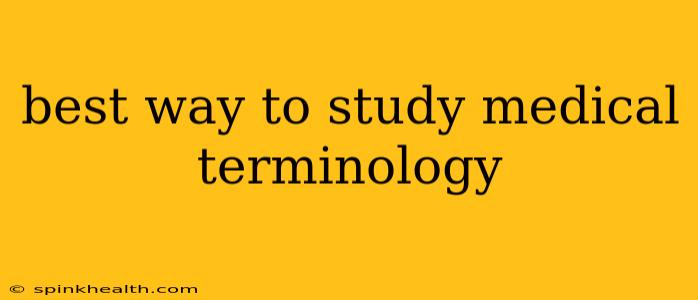Decoding the Language of Medicine: The Best Way to Conquer Medical Terminology
The world of medicine is filled with a fascinating, yet often intimidating, language—medical terminology. For medical professionals, mastering this lexicon is essential. But even for those outside the field, understanding medical jargon can empower you, whether you're navigating your own healthcare, supporting a loved one, or simply satisfying your curiosity. This isn't about memorizing endless lists; it's about learning a system, a language with its own grammar and rules. Let's unlock the secrets to mastering medical terminology effectively.
My journey into the world of medical terminology began not in a sterile classroom, but in the vibrant, chaotic environment of a hospital. As a young volunteer, I was constantly bombarded with terms I didn't understand. This sparked a desire to decipher this unique language, and through trial and error, I discovered the most effective strategies. This isn't just theoretical advice; it's battle-tested wisdom gleaned from personal experience.
Understanding the Building Blocks: Root Words, Prefixes, and Suffixes
This is where the magic happens. Medical terminology isn't random; it's built upon a foundation of core components.
- Root words: These are the foundation, representing the main concept (e.g., cardi meaning heart, hepat meaning liver).
- Prefixes: These come before the root word, modifying its meaning (e.g., tachy- meaning rapid, brady- meaning slow).
- Suffixes: These come after the root word, often indicating a condition, procedure, or specialized area (e.g., -itis meaning inflammation, -ectomy meaning surgical removal).
Imagine these components as LEGO bricks. By understanding each individual brick and how they combine, you can construct a vast array of medical terms. For instance, tachycardia (rapid heart condition) is built from tachy- (rapid), cardi (heart), and -ia (condition).
How Can I Learn Medical Terminology Effectively?
Many students find rote memorization overwhelming. A more effective approach involves active learning and repetition.
-
Flashcards: The classic method remains relevant. Create flashcards with terms on one side and their definitions on the other. Use spaced repetition techniques to reinforce your learning.
-
Medical Terminology Books and Workbooks: Choose a book with clear explanations, plenty of examples, and practice exercises. Don't just passively read—actively engage with the material.
-
Online Resources and Apps: Numerous websites and apps offer interactive lessons, quizzes, and games to make learning fun and engaging. Utilize these tools to supplement your studies.
-
Focus on Context: Don't just memorize definitions in isolation. Try to understand the terms within the context of medical situations and scenarios. This will help solidify your understanding.
-
Practice, Practice, Practice: The key to mastering any language is consistent practice. Regularly review terms, test yourself, and use the vocabulary in conversation (if possible).
What are Some Common Medical Terminology Prefixes and Suffixes?
This is where a comprehensive textbook will be invaluable. However, here are a few frequently encountered examples to get you started:
- Prefixes: a- (without), anti- (against), hyper- (excessive), hypo- (deficient), inter- (between).
- Suffixes: -algia (pain), -oma (tumor), -pathy (disease), -plasty (surgical repair), -tomy (incision).
What is the Best Way to Remember Medical Terminology?
There's no single "best" way, as learning styles vary. However, combining different methods—flashcards, online resources, and real-world application—is often the most effective. Make it relevant to your interests, creating memorable associations to improve retention. For example, if you love cooking, try relating medical terms to cooking ingredients or processes.
Are There Any Online Resources for Learning Medical Terminology?
Yes, many excellent online resources are available, ranging from free websites to subscription-based courses. A simple online search will uncover a plethora of options, allowing you to find the best fit for your learning style and budget.
Mastering medical terminology is a journey, not a sprint. By approaching it systematically, focusing on the building blocks, and actively engaging with the material, you can unlock the secrets of this fascinating language and gain a deeper understanding of the world of medicine. Remember, consistent effort and a strategic approach are key to success.

